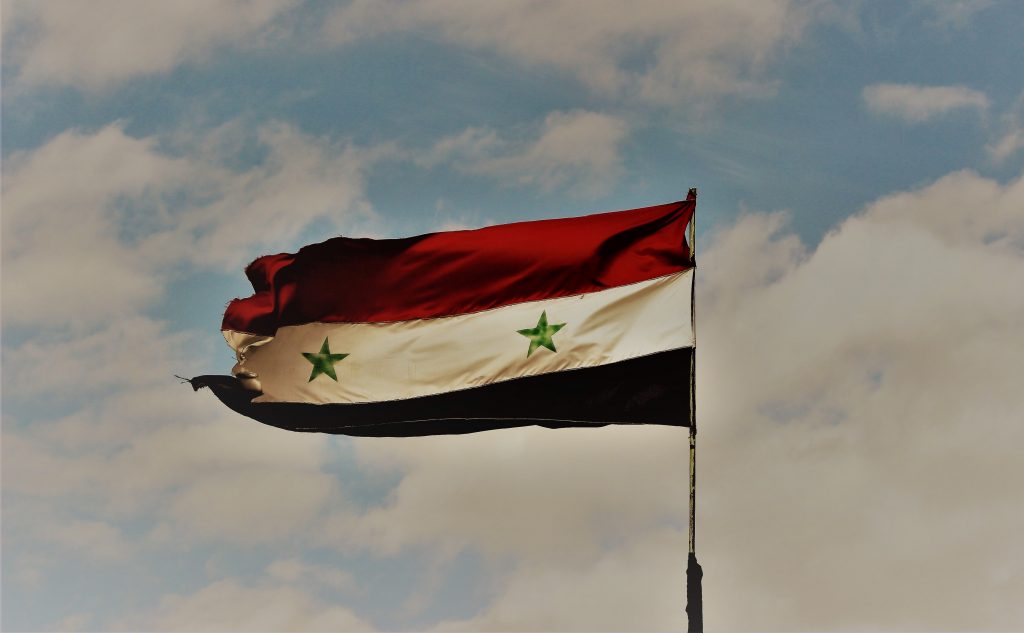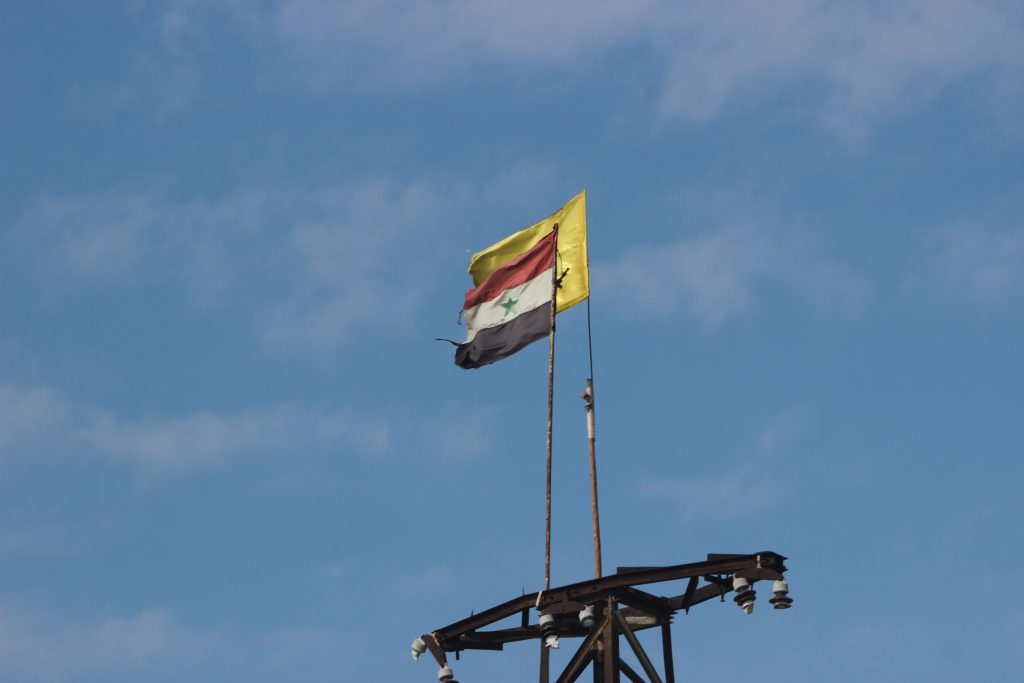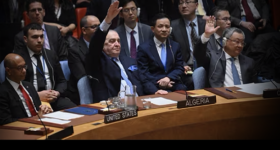
Andrew Korybko
21st Century Wire
Just when the global public assumed that everything was going to settle down in Syria after the Liberation of Aleppo, a couple of curve balls were thrown by the US and even Russia, indicating that events are actually going to dramatically speed up in the coming future. While there might be a temporary and relative military lull due to Aleppo’s liberation, the Syrian Arab Army’s desire to safeguard its rapid gains, and the so-called “ceasefire” which was recently agreed to, all this means is that local fighting has died down while the political and international campaigns are on the verge of heating up.
The ‘Draft Constitution’
To address the political the aspect of what’s about to happen, Russia just wrote a “draft constitution” for Syria which the author extensively analyzed in a two-part series for Regional Rapport, concluding that it unwittingly opens up a Pandora’a Box of problems such as suggesting the implementation of Lebanon’s failed political-sectarian “confessional” system, the devolution of all or part of the state into “autonomous” or “federal” units, and the swearing off of war and embrace of “good neighborliness” which seem to imply abandoning the Palestinians, recognizing “Israel”, and forfeiting Damascus’ historic ownership claims to the Golan Heights which are nowadays illegally occupied and annexed by “Israel”.
Although Russian diplomats and generals insist that they are not pressuring Syria to implement any of Moscow’s proposed measures and instead claim that they innocently offered them up in order to serve as a useful set of guidelines that could catalyze the stalled political process, Russian Foreign Minister Sergei Lavrov also said that the “draft constitution” will become a focal point of discussions at the upcoming intra-Syrian Geneva meetings, thereby suggesting the de-facto broadening and further internationalization of what should ordinarily be a purely domestic process.
Interestingly, it was also announced that the Geneva gathering had been pushed back from the beginning of February to the end of the month, and although it can’t be known for certain, it seems plausible that this might have been because Damascus requested more time to consider Moscow’s constitutional “proposals” before formulating its official response and potential counterpoints.

Syrian Arab Republic flag flying above liberated Sheikh Saeed, East Aleppo. December 2016 (Photo:Vanessa Beeley)
The reason why Russia is so anxious to settle the issue of Syria’s constitution as soon as possible is because Moscow wants to meet the June 2017 deadline for completing this process and holding subsequent new elections, inevitable outcomes which are mandated by UNSC Res. 2254. The end of February won’t just be significant for advancing UN-presided “intra-Syrian” talks on the Moscow-written “draft constitution”, but will also be the time of military reckoning by which Russia and the US might commence joint anti-Daesh air strikes and other counterterrorist cooperation in Syria.
The Trump-Putin Phone Call
President Trump spoke to his Russian counterpart over the weekend and expressed enthusiastic willingness to work together in fighting Daesh, which would fulfill one of the most important international aspects of his campaign platform. The Russian side expectedly seemed to agree to this, and later on it was revealed that Trump also directed his Secretary of Defense “Mad Dog” Matis to come up with a plan for defeating Daesh within the next 30 days. As coincidence would have it, the deadline falls on late February, right around the time when the “intra-Syrian” talks in Geneva are supposed to recommence in discussing the Russian-written “draft constitution”.
Political Sensitivities And Deal-Making
On the surface, it would certainly be a welcome development if both leading Great Powers teamed up to fight terrorism, but it can’t be forgotten that they’d be operating over Syrian airspace and that Damascus has yet to grant this privilege to Washington despite the US having been doing so already, without consequence, for nearly a year and a half now. That doesn’t mean, however, that Syria’s sovereign rights should continue to be trampled on, and Russia shouldn’t enter into any deals with the US pertaining to joint operations on Syria’s territory without consulting and receiving the approval of Damascus.
Along this tangent, it would be odd for Damascus to give flyover and anti-terrorist rights to Washington when the US doesn’t officially recognize the democratically elected and legitimate government of President Assad and has hitherto had an official policy of overthrowing him. Thus, it’s likely that some sort of Russian-mediated deal would have to be struck whereby the US partially, and even if only temporarily, recognizes President Assad as the rightful leader of Syria, perhaps as the presiding figure during a phased “leadership transition”.
The author is by no means advocating for such an arrangement to be struck since it’s ridiculous to countenance that President Assad should make any concessions on his presidential standing precisely at the point when the Syrian Arab Army is winning the war, and nor should he go back on his oft-repeated pledge that only the Syrian people themselves can directly determine his political fate through the electoral process, but knowing the wily US, they will at least make an attempt to reach this sort of deal even if it ultimately fails.
Nevertheless, it’s clear that some sort of understanding needs to be reached between Damascus and Washington, otherwise Moscow would be humiliating Syria by violating its ally’s sovereignty in unilaterally “inviting” the US to partake in joint counter-terrorist operations in the country. There’s no precedent for suggesting that Russia would do this, however, but the point is being raised simply to emphasize that it’s very predictable that the US and Syria are about to enter into a period of secret negotiations brokered by Russia for the reasons explained above.
The Saudi Surprise
Relatedly, there’s also another major issue which will have to be discussed between the US, Russia, and of course Syria, and that’s Trump’s promise over the weekend to Saudi King Salman that their forces will work together to carve out “safe zones” in Syria and Yemen. Saudi Arabia is a hated enemy of Syria after having unceasingly supported the head-chopping terrorist mercenaries over the past 6 years, and there seems to be little realistic chance that Riyadh will reverse its stance and recognize the real authorities in Damascus.
Nor, for that matter, does there seem to be much likelihood that Damascus will allow Riyadh to join the US’ forthcoming anti-Daesh campaign, which will create serious political complications for this impending operation. Russia already agreed to work with the US in this regard (pending what can be assumed will eventually be Damascus’ approval per the deal-making described above), but Moscow hasn’t openly discussed anything pertaining to Washington’s unilateral “invitation” for Riyadh to participate in this framework.
Russia and the US want to jointly fight terrorism in Syria not only because of the necessity to multilaterally confront this pressing global danger, but also as a symbolic “photo opportunity” that represents the beginning of Moscow’s sought-after New Detente with Washington in the New Cold War and crafts the perception of military parity between Russia and the US. It’s therefore very important for Russia to achieve this goal, and the US knows this which is why it unilaterally discussed carrying out enhanced counterterrorist operations with Saudi Arabia in Syria and the promotion of so-called “safe zones” in the country, the latter of which Lavrov surprisingly just declared that Moscow would support provided that Damascus grants its approval.
Spoiling The New Detente?
Russia, eager to reach a New Detente, might belatedly accept these new “terms” and have no disagreements in principle with Saudi Arabia launching US-assisted bombing runs against Daesh, provided of course that Syria agrees, which therein presents the challenge. If Damascus agrees to only allow Washington to jointly carry out these missions with Moscow (including constructing “safe zones”, which are unlikely to be approved by Damascus though still possible in principle) but refuses to grant such a privilege to Riyadh, then a serious problem might ensue which could thrust Russia on the horns of a dilemma.
Moscow would in that case be forced to choose between going along with Washington and Riyadh in the interests of achieving a New Detente and therefore disrespecting Syria’s sovereignty, or properly respecting Syria’s airspace by cooperating with the US (assuming that Damascus agrees to this) but refusing to allow the Saudis to conduct operations in the country. The latter option might cause friction between the US and Russia and ultimately be unenforceable if Moscow doesn’t have the political will, which all in all would jeopardize the incipient and promising plans for a New Detente.
Even more frightening, it should be understood that Trump’s proposal for Saudi Arabia to join the US in destroying Daesh and carving out “safe zones” in Syria wasn’t just extended to Riyadh, but to the entire multinational “anti-terrorist” coalition that it leads, as it’s very likely that the Kingdom will try to flex the perceived importance of this structure by involving it in the US’ suggested operations. Should this turn out to be the case, then it would likely be rejected by Damascus and thus put Moscow in a very uncomfortable position.
Damascus’ Deal-Making Options
The only “workaround” that can be thought of at this time would be for Syria to discretely allow all of this in exchange for Russia importantly drawing down its unstated pressure on Damascus to agree to the many controversial terms set forth in the Moscow-written “draft constitution”. To be clear, the author is not lobbying for this to happen, but is simply proposing an idea which will ultimately depend on the Syrian authorities to accept or reject, but the intent behind this move is to help Damascus think of creative ways to remove itself from the strategic “corner” that the fast-moving political and international events seem to be pushing it in.
Along the same lines of creative thinking, if Russia and the US are planning to launch joint anti-terrorist operations in the country and possibly even bring along Saudi Arabia and its own “anti-terrorist” coalition (likely without Syrian support for the latter), then Damascus might find it wise to consider formally inviting Tehran to partake in airstrikes as well. Iran wouldn’t by any means cooperate with the US given the once-again rising tensions between both sides, nor for that matter might it do so in coordination with Russia if the below-the-surface rivalry between the two continues to bubble, but it would be a very symbolic way for Syria to demonstrate its disapproval over Saudi Arabia and its coalition’s possibly impending operations in the country.
The Hezbollah Factor
Another reason why this idea is being offered is because the fate of Hezbollah’s deployment in the country will soon become an issue in the conflict negotiation process. It can be safely assumed that the “moderate opposition rebels” won’t agree to any sort of political solution that includes Hezbollah’s continued presence in Syria, but Moscow, Tehran, and Damascus have already publicly agreed that no military solution is possible and thus have limited options in responding to this sort of intransigence, if it does in fact transpire.
Understanding which way the wind is blowing and seeing that most of the “international community” involved in Geneva are totally opposed to Hezbollah’s deployment in Syria, it can be confidently predicted that an unprecedented amount of pressure will be put on Damascus once the UN-presided “intra-Syrian” talks there resume at the end of next month. Russia’s position on the future of Hezbollah’s in-country presence is unclear, but Moscow’s very close relations with Tel Aviv and it’s desire to reach a hoped-for New Detente with Washington might point to its “flexibility” on this issue in a way which might end up running counter to Tehran’s interests.
Therefore, if Syria and Iran both envision Hezbollah playing a constructive post-conflict role in the country, then one of the most reliable ways to ensure this is to invite Iranian aircraft into Syria just like Damascus did with Russian ones and then potentially “negotiate” their withdrawal later on as part of a “compromise settlement” with the “moderate opposition rebels” to allow Hezbollah to remain inside Syria. Again, so as not to be misunderstood, the author isn’t pushing anything on Syria, but is simply making well-intentioned suggestions with the hope of helping Damascus maximize its position and safeguard its sovereign interests.
Syrian Arab Army soldier in Sheikh Saeed, East Aleppo – one day after liberation by SAA and allies from Nusra Front-led occupation. (Photo: Vanessa Beeley)
Concluding Thoughts
Taking stock of the fast-moving political and international situation around Syria, it’s evident that major changes are unfolding as all sides prepare for the final end game in advancing their preferred “solution” to the country’s war. More and more, the Russian and American positions are coming together due to both Moscow’s desire for a New Detente and Washington’s urgent need to reverse the failings of the prior Obama Administration.
As part of this strategic convergence, however, immense pressure looks likely to be put on Syria to conform to the new global geopolitical arrangement speculatively set out in the New Detente, and this might result in Russia and the US squeezing the country to make concessions over the “draft constitution”, “safe zones”, and perhaps other measures as well in the interests of the “greater good”. Damascus’ options are understandably really limited at this moment, but it could possibly change the entire situation by inviting the Iranian Air Force into the country to partake in immediate anti-terrorist strikes.
Russia, no matter what its position, may or may not be pro this move, wouldn’t be in a position to stop it because it wouldn’t risk war with the Islamic Republic over Damascus’ legitimate invitation for it to join in the counterterrorist bombings in the country. Tehran, for its part, might calculate that with it being all but inevitable that Trump will scrap the nuclear deal anyhow and team up with “Israel” to launch a forthcoming “Green Revolution 2.0” during the May elections, Iran should seize the strategic initiative in protecting its international interests while it still has a chance to do so and it isn’t too late.
All in all, the War of Terror on Syria is fast approaching its ultimate resolution, though it’s increasingly becoming apparent that the country is becoming a meeting place for various Great Powers to hash out deals among themselves in reorganizing the world order. Amidst the larger global intrigue taking place on its territory in the name of the “greater good”, it’ll be ever more challenging for Damascus to protect and promote its previously stated interests, thus necessitating it to either engage in a series of far-reaching concessions or dramatically change the entire strategic landscape, perhaps by formally inviting the Iranian military to conduct anti-terrorist airstrikes in the country (provided that both sides independently conclude that this is in their best interests, of course).
READ MORE SYRIA NEWS AT: 21st Century Wire Syria Files
SUPPORT 21WIRE and its work by Subscribing and becoming a Member @ 21WIRE.TV

















